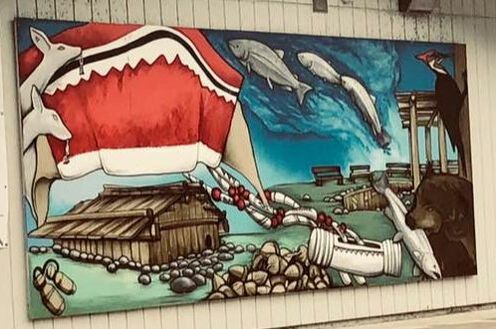In preparation
- Ramos, S. C., A. Alexander and A. Kinziger. Hīkina te mānuka: responding to the challenge of broader inclusion of Indigenous contributions to molecular ecology. Molecular Ecology Resources
Published
- Ramos, S. C., T. Williams-Claussen, and C. Gray. 2024. Yurok-wildlife relationship through the context of Traditional Ecological Knowledge. Journal of Wildlife Management. <https://wildlife.onlinelibrary.wiley.com/doi/10.1002/jwmg.22624>.
- Ramos, S. C. and M. Culver. 2024. Integration of Indigenous Research Methodologies, Traditional Ecological Knowledge and molecular scatology in an assessment of mesocarnivore presence, diet and habitat use on Yurok Ancestral Lands. Molecular Ecology Resources. <https://onlinelibrary.wiley.com/doi/epdf/10.1111/1755-0998.13963>.
- Suzukawa, J., S. C. Ramos, T. M. Williams-Claussen. 2023. Yurok Traditional Ecological Knowledge as related to elk management and conservation in S. Albert and S. Hoagland, editors. Wildlife Stewardship on Tribal Lands: Our Place is in Our Soul. Johns Hopkins University Press, Maryland, USA
- Ramos, S. C. and J. Gensaw. 2023. Meyweehl see 'oohl megetohlkwopew (Elk and the Yurok people take care of each other) in S. Albert and S. Hoagland, editors. Wildlife Stewardship on Tribal Lands: Our Place is in Our Soul. Johns Hopkins University Press, Maryland, USA
- Ramos, S. C. 2021. Understanding Yurok Traditional Ecological Knowledge and wildlife management. Journal of Wildlife Management 1-21. <https://doi.org/10.1002/jwmg.22140>.
- Ramos, S. C. 2019. Sustaining hlkelonah ue meygeytohl in an ever-changing world In K. D. Lara-Cooper and W. Lara, Sr., editors. K'am t'em. Great Oak Press, Temecula, CA.
- Ramos, S. C. 2018. Considerations for culturally sensitive Traditional Ecological Knowledge research in wildlife conservation. Wildlife Society Bulletin 42(2):358-365.
- Ramos, S. C., T. M. Shenk, and K. M. Leong. 2016. Introduction to Traditional Ecological Knowledge in wildlife conservation. Natural Resource Report. NPS/NRSS/BRD/NRR-2016/1291. National Park Service, Fort Collins, CO, USA. https://irma.nps.gov/DataStore/Reference/Profile/2233065.
- Blount*, S. J. and J. L. Koprowksi. 2012. Response of the Mount Graham red squirrel (Tamiasciurus hudsonicus grahamensis) to postfire conditions. The Southwestern Naturalist 57(1):8-15. [*Legal name change from S. J. Blount to S. C. Ramos after 2012].
